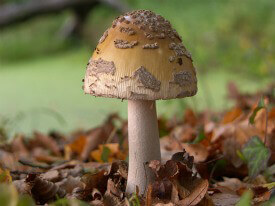This article originally appeared on PETA Prime.
About this time every year, there’s a tree on my mom’s street that sprouts a large, orangey mushroom at its base. This is a “chicken of the woods” mushroom that, you guessed it, tastes just like chicken. Rinsed, sliced into chunks, and sautéed, it’s the perfect cruelty-free addition to pasta sauce and stir-fries.
However, not all mushrooms are as kitchen-ready as chicken of the woods. We’ve had a lot of rain here lately, which has caused all sorts of strange-looking mushrooms to pop up—and some of them may be extremely toxic. This got me thinking. What if one of the neighborhood dogs stumble upon one of those?! Unless you happen to have a mushroom expert living across the street (as my mother does), you know that it’s safest to steer clear of wild mushrooms. Some benign mushrooms can be dead ringers for more toxic fungi, but our little animal friends are not always that discriminating. I decided to do some research to find out, so I called the Pet Poison Helpline. This resource was so wonderful that I thought I would share it with all of you right here.
The advice I received from the folks at the Pet Poison Helpline was that when you see mushrooms pop up in your yard, you should pull them up immediately and throw them away to make sure that your animal companions (and your neighbors’) can’t ingest them.
While researching my mushroom question, I educated myself about many other potential hazards. Other autumnal poison hazards include mothballs (they may contain either paradichlorobenzene or naphthalene, which can cause vomiting, severe abdominal pain, tremors, weakness, and kidney or liver failure), rat poison (don’t go there-use PETA’s humane mousetrap to deal with unwanted four-legged houseguests instead), antifreeze, and compost heaps (where more deadly fungi can linger).
You can find out more about poison hazards-and how to keep your animal friends safe from them-at PoisonPetHelpline.com.
Do you know of any other common plants or household products that are toxic to animals? If so, let us know!
Text VEG to 73822 to get the latest vegan lifestyle tips, recipes, and urgent action alerts texted right to your phone.
Terms for automated texts/calls from PETA: https://peta.vg/txt. Text STOP to end, HELP for more info. Msg/data rates may apply. U.S. only.







